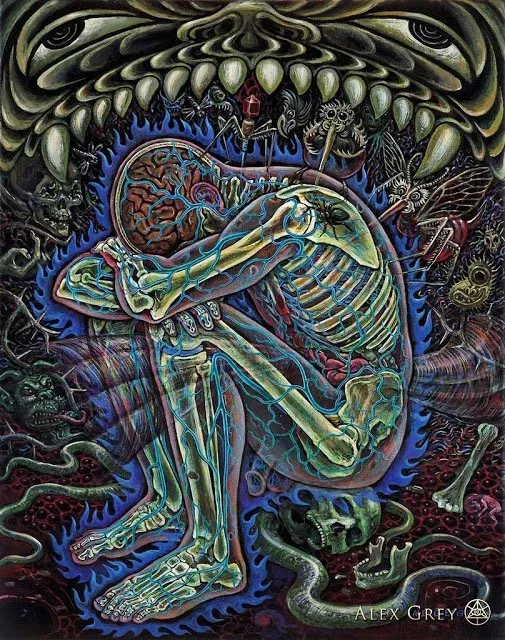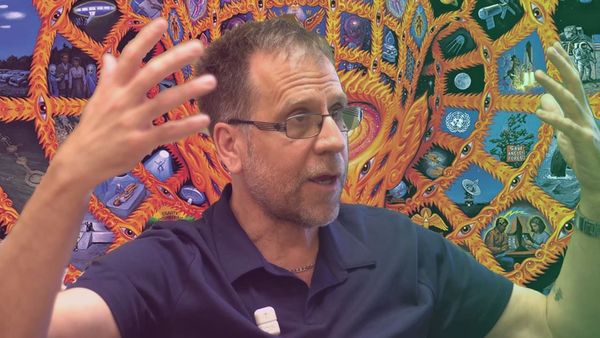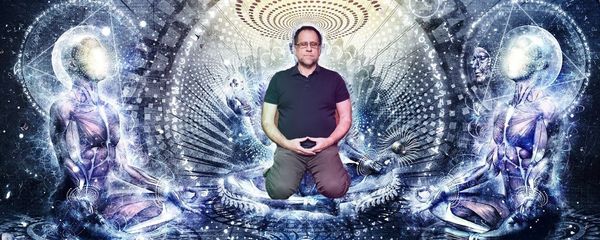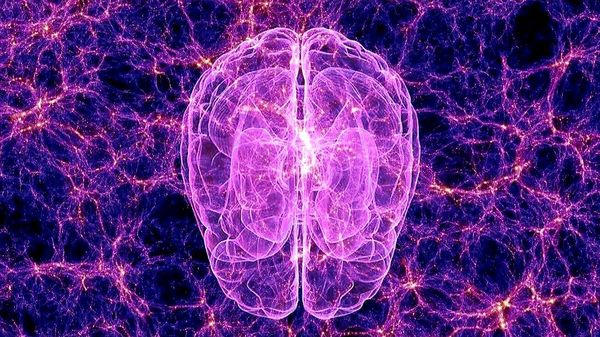Jon Brooks • • 13 min read
10 Best Positive Psychology Books You Need To Read For Authentic Change
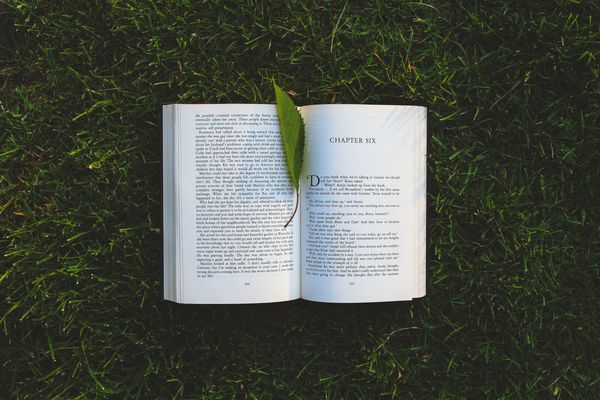
Self-help done right is one of our greatest gifts in modern society. But let’s not kid ourselves here: done wrong, it isn’t just ineffective, it has the potential to do serious harm.
Go to any self-help event, and you’ll find people in the room who show up year after year, yet remain stuck in the same attitudes and thought loops. To the rest of the world they go backwards — they become strange parroter’s of positivity quotes and dish out profound, but incongruent, life advice to anyone in earshot.
In their mind, of course, they are doing something with their lives. They are becoming ‘self-actualised‘.
Their passion for personal development transforms into an obsession. They develop a sense of superiority because they know things other people don’t. But in the end, they feel alienated from normal people. They keep listening to their motivational guru, even more now because time is ticking. Years go by, each self-help event signalling the slipping of time.
It is therefore of the utmost importance if we don’t want to end up in this predicament, to read the right books. It is possible to transform ourselves into better, healthier people, but only with the best tools at our disposal.
So below, I’ve listed the ten best positive psychology books you need to read if you are looking for authentic change. These obstacle courses for the mind will give you a balanced and highly effective reading curriculum in personal development. Everything from philosophy and cutting-edge neuroscience, to brain hacks and ancient wisdom is covered.
1. 59 Seconds: Think A Little, Change A Lot – Richard Wiseman
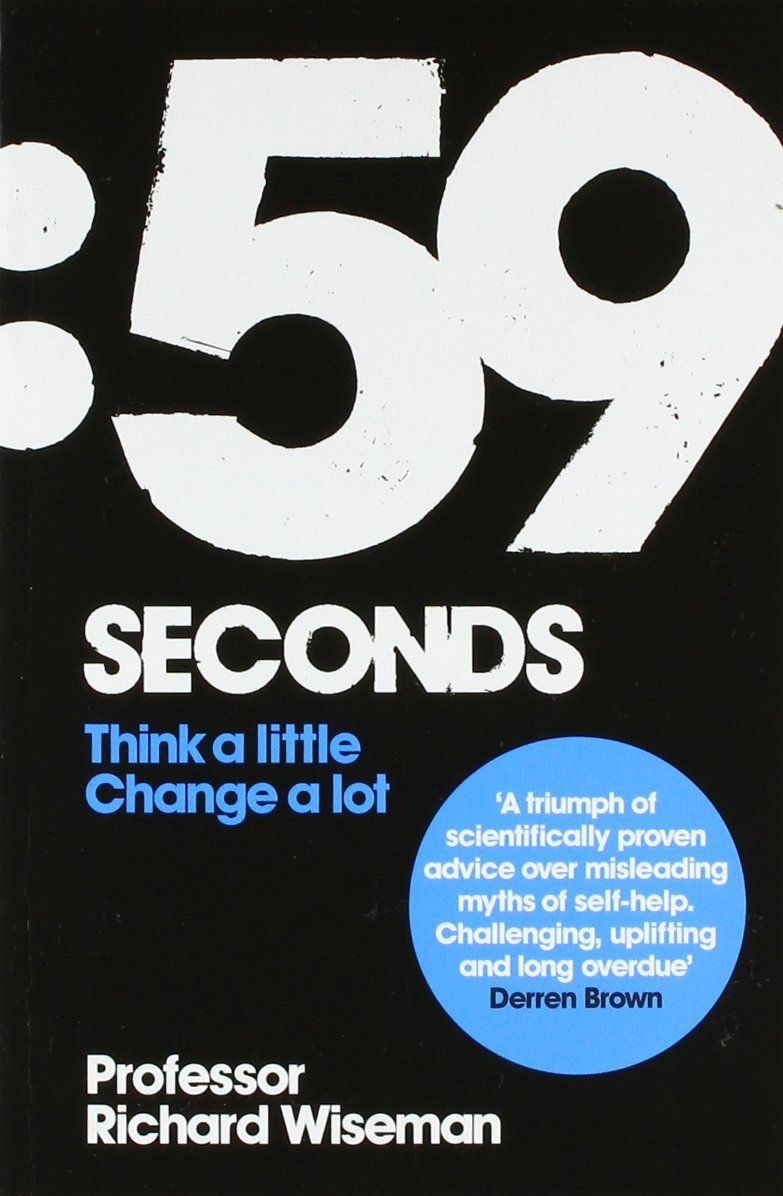
Professor Richard Wiseman has spent his whole career exploring the curious and quirky side of human nature. He’s published papers on everything from the psychology of being fooled by magic to the strange power our initials have over our destinies. He’s taken part in ghost hunts (he’s found no evidence) and has practiced hypnosis and magic as a semi-professional.
In 59 Seconds, Wiseman turns his attention to the field of self-help. He begins the book by telling us the story of the famous 1953 ‘Yale Goal Study’ which showed that the 3% of Yale students who wrote down their goals, 20 years later, had accumulated more wealth than the other 97% combined. A powerful study that often gets referenced in popular self-help books in the ‘goal-setting’ section.The only problem with the study, says Wiseman, is that it never actually happened. It’s fictional, like many popular self-help myths he spends the remainder of the book debunking.
Professor Wiseman provides us with ten in-depth chapters, each covering important self-improvement topics including happiness, motivation, persuasion, attraction and creativity. He tells us what doesn’t work and then breaks down the unusual empirical research that has the proven power to truly change your life. It’s a must read for anyone serious about peak performance and emotional well-being.
The book is called 59 Seconds for a reason. According to Wiseman, “Change doesn’t have to be a slow process.”
Just want the tips? Read just the insights of 59 Seconds for free on Blinkist.
2. How Proust Can Change Your Life – Alain De Botton
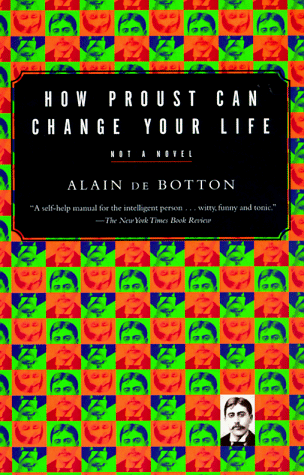
Sometimes, you read a book and feel as though it has been written specifically for you. The author is able to put into clear sentences deep confused feelings you recognise as your own but struggle to express yourself. This book is that kind of book. Every sentence in How Proust Can Change Your Life packs a punch of Proustian profundity.
The author, Alain De Botton, often called the ‘philosopher of everyday life’, begins the book by asking us how we would spend our last hour if faced with an impending cataclysmic catastrophe that would wipe out all human life. De Botton then tells us that this same question, in 1922, was posed to French celebrities in a publication of L’Intransigeant. Most celebrities responded to this grim question with a sad contemplation. Some said they would ready themselves for the afterlife by praying, others that they’d play their last bittersweet round of golf.
When it came Marcel Proust’s turn to answer, he responded with a strange joyousness at the thought of an apocalypse:
“I think that life would suddenly seem wonderful to us if we were threatened to die as you say. Just think of how many projects, travels, love affairs, studies it — our life — hides from us, made invisible by our laziness which, certain of a future, delays them incessantly.”
De Botton takes Proust’s vast works, letters and journals and decodes the wisdom within for us to use. It’s a rare type of self-help book that’s aim for the reader isn’t success, but wisdom.
Instead of consoling us on the ‘misery of death’, together, they show us how the brevity of existence can help us ‘love life today’; instead of teaching us how to ‘avoid negative emotions‘; they teach us how to ‘suffer successfully’; instead of showing us ‘how to talk to anyone’ at a party, they shows us ‘how to be a good friend‘; instead of filling our minds with dreams of adventure and spectacle, they show us how objects as mundane as kitchen utensils can have profound beauty if only we teach ourselves ‘how to open our eyes‘.
How Proust Can Change Your Life is a deeply transformative reading experience that, unlike most self-help books, genuinely lives up to its title.
3. The Happiness Hypothesis: Putting Ancient Wisdom to the Test of Modern Science – Jonathan Haidt
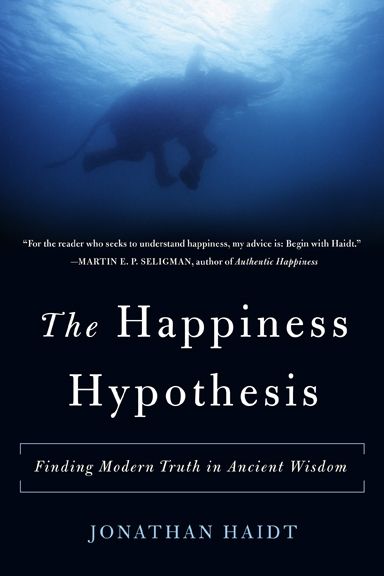
If you think you know what happiness is, think again. In this positive psychology masterpiece, Jonathan Haidt weaves practices as disparate as Eastern philosophy and psychiatric pharmacology together to break the myths about what makes us happy and provides the insights for what does.
In describing The Happiness Hypothesis, Jonathan Haidt says:
“This is a book about ten Great Ideas. Each Chapter is an attempt to savour one idea that has been discovered by several of the world’s civilisations — to question it in light of what we know from scientific research, and to extract from it the lessons that still apply to our modern lives.”
Jonathan Haidt begins the book by describing the problems of the divided self, using Buddha’s metaphor of the mind being like a wild elephant — trainable, but no slave to its master. He then finds the commonalities between Buddha’s definition, Freudian psychoanalysis and modern neuroscience to help us make sense of the dissonance between our animal selves and our higher selves. Deeply fascinating stuff that explains why we don’t act in ways we know we should, and what to do about it.
Throughout the book, Haidt dissects the roles of adversity, love, God and kindness to aid us in our pursuit of happiness. After reading this book, your life values will go under serious reconsideration, and you’ll be much happier because of it.
4. Tricks of The Mind – Derren Brown
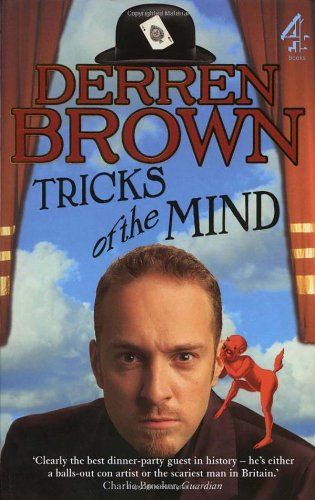
Derren Brown has made his living from being able to predict and control human behaviour with frightening accuracy. As well as being a psychological illusionist he has proved himself a reputable portrait artist, author, and showman. In his autobiography, Confessions of a Conjuror, he also reveals he is a voracious reader and has, “An addiction to self-help books.”
In Tricks of the Mind, Derren Brown takes us on a tour of his mind and offers his best insights on many popular self-help subjects. He gives his tips on speed-reading, Neuro Linguistic Programming (NLP), confidence, reading body language, memory techniques, hypnosis and much more.
Although Derren Brown performs psychic readings and seemingly supernatural feats, he is an open skeptic and atheist. He does not claim to have any supernatural powers and has an amazing chapter on critical thinking and irrationality at the end of the book.
I love Derren’s enthusiasm for learning self-help techniques, but I also admire his skepticism and demand for evidence. This book offers amazing and useful ways to perform tricks with your mind, while always reminding us how easily our minds can be tricked.
5. Happier: Learn the Secrets to Daily Joy and Lasting Fulfilment – Tal Ben-Shahar
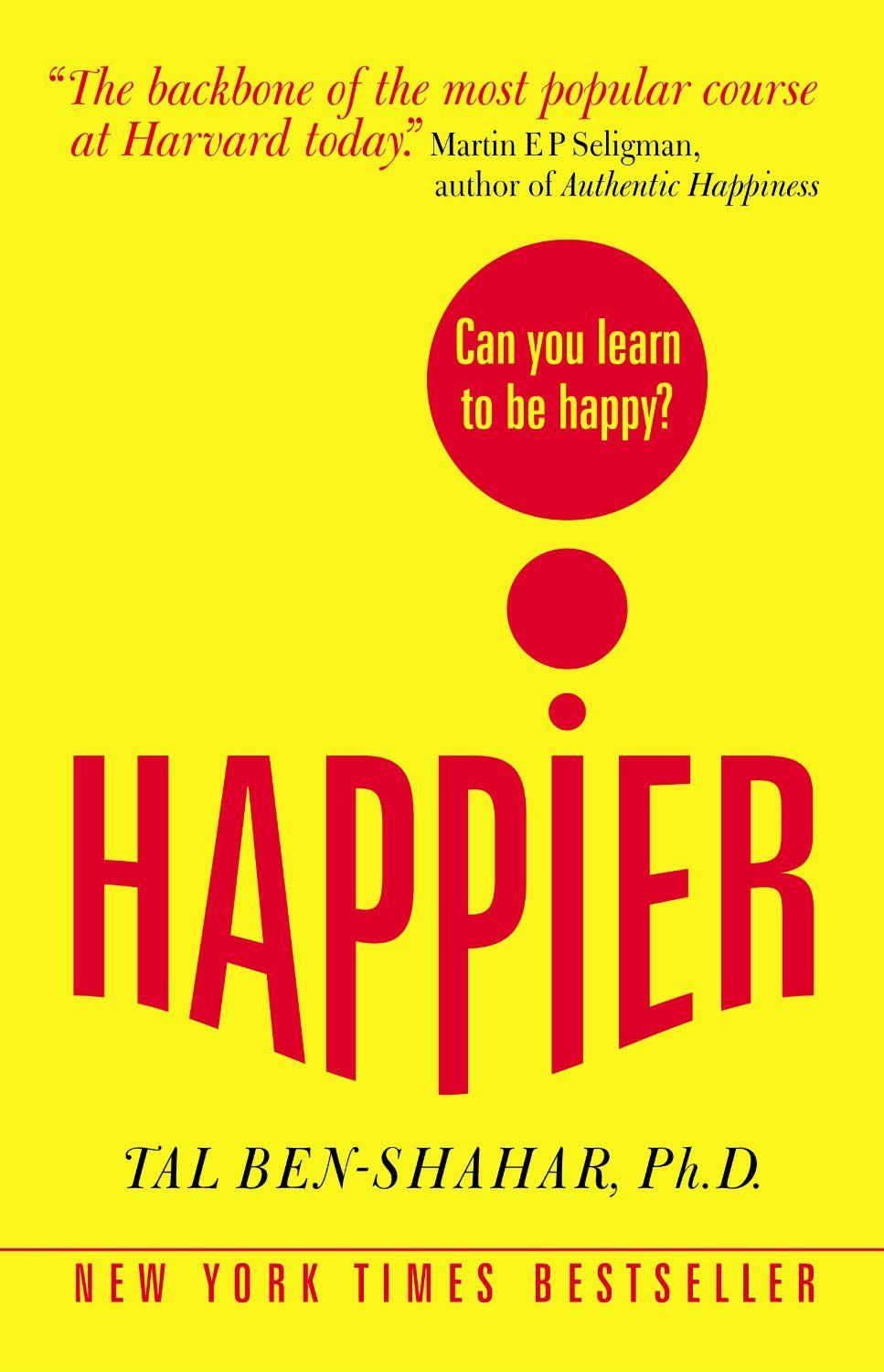
In 2004 Harvard’s positive psychology undergrad course had 20 students in attendance. Two years later there were 900, making it the most popular Harvard course of all time. The Israeli-born teacher Tal Ben-Shahar was the mastermind behind the course’s success.
I’ve seen all twenty-four of his course’s lectures, and I can tell you that you don’t have to. After the course’s success Tal Ben-Shahar had the media profile to publish his defining positive psychology magnum opus. Happier is that work.
In the book, he covers everything from meditation to gratitude and goal setting while weaving intimate stories about his own life and failures into the scientific research to help hammer the lessons home.
Tal Ben-Shahar defines positive psychology as combining ‘the charisma of self-help with the rigour of academia’. That definition sums up this book perfectly. Tal Ben-Shahar is the most influential teacher on my writing and is solely responsible for getting me to start meditating daily. I can’t endorse this book enough.
6. A New Earth: Create a Better Life – Eckhart Tolle
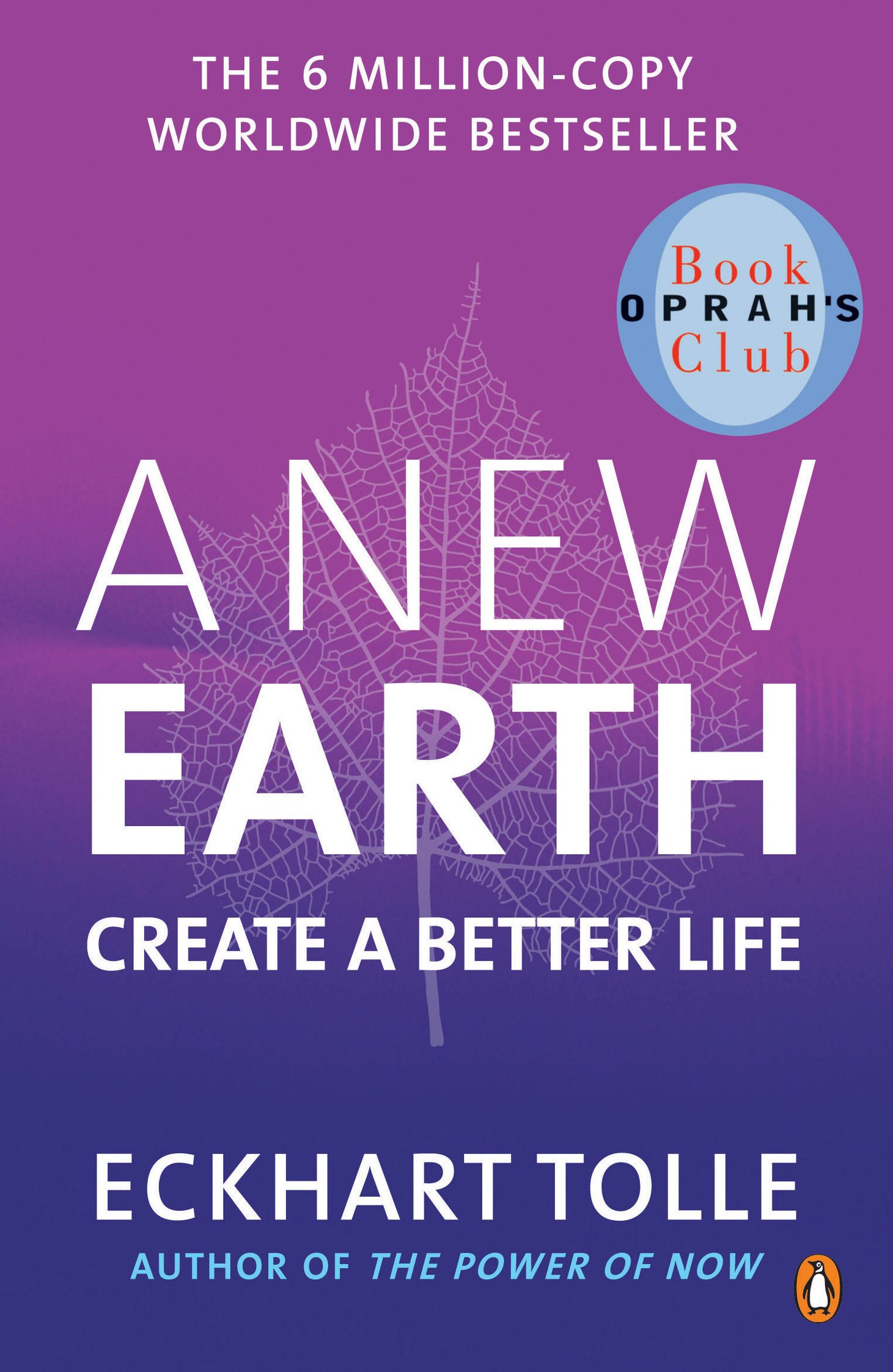
Eckhart Tolle suffered from extreme depression for most of his adult life. When he was 29, he started to entertain suicidal thoughts. One particular night in the early hours of the morning he was struck by a sickening dread and came closer than ever to fulfilling the suicidal demands in his head. When he woke the next day, everything seemed different — lighter. The obsessive thoughts had stopped. He felt at peace. Eckhart didn’t know it, but he later realised he was experiencing what many call enlightenment.
In his first book, The Power of Now, Tolle teaches us what enlightenment is, what it feels like and how one goes about attaining it. He answers questions about the vague concept of ‘being’ and provides spiritual signposts to direct us on our own journey to enlightenment. A New Earth, on the other hand, is more of a user’s manual for enlightened daily living. Inside, Eckhart Tolle shows us how to balance self-acceptance with self-improvement gives us his enlightened view of adversity, conflict, suffering, pain, success and happiness.
I studied this book obsessively leading up to my major jaw surgery. For the first week after the surgery, walking a few steps and speaking demanded a huge effort. For the first month, I sustained myself on a purely liquid diet. When I visited the hospital for checkups, they seemed more concerned about my mood than my physical recovery. “Everyone has a low point”, they said, “Depression is common after this surgery.”
I never had a low point, and I owe that to this book.
7. Psychobabble: Exploding The Myths of The Self-Help Generation – Stephen Briers
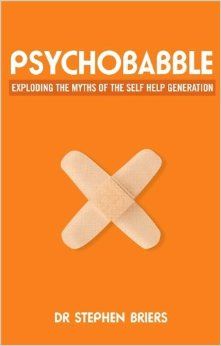
Self-development can be a wonderful thing when it works. When it doesn’t, however, it can be psychologically harmful. The loss of control we feel over our lives when we fail to change can lead to depression and anxiety. We feel good when we’re in the motivational seminar, but six months later when we find ourselves still broke and lonely, those who study self-development can be particularly nasty to themselves.
Stephen Briers is a British clinical psychologist. His job is helping people to make meaningful change in their lives, and overcome serious mental illnesses. Briers, as someone who fights on the front line of mental health, is understandably frustrated with the popular depictions of the brain being like a computer that can be ‘hacked’ at will.
In Psychobabble, he looks at the problems with practices such as trying to raise self-esteem, being a super learner, discovering the real you, self-affirmations and even the pursuit of happiness itself. He provides an excellent counterbalance for other positive psychology books. Even though he has written books on Cognitive Behavioural Therapy (CBT), he lists the problems and possible setbacks with that too.
Being a zealot for any self-help technique won’t help you. Brier’s argument isn’t that self-help terrible, it’s that in certain contexts it can be. Just because something has a few studies showing that it can have benefits, we should still carefully examine the situations when it does not.
Each of the 23 chapters debunks a different myth. People who get into self-help can often end up preachy and somewhat delusional. Psychobabble is perfect the antidote for such a malady.
8. The Consolations of Philosophy – Alain De Botton
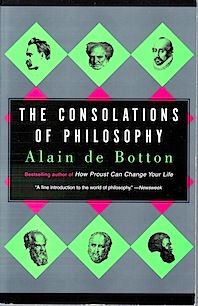
In an interview, when asked for his opinion on getting more out of reading, Alain De Botton said:
“I think the point of reading is to help you to live. It’s not to pass an exam. It’s not to sound clever. It’s to get something out of it that you can use. And my goal as a writer is to try and prompt the reader towards what could broadly be called ‘self-help’. Now that’s a very pejorative term, but a very important one. We should be reading to help ourselves and to help our societies. I don’t believe in knowledge that’s abstract and simply made to impress. I believe in knowledge that can bring us, in the broadest sense, happiness.”
When motivational speakers talk about themselves achieving success there’s a strange irony. They motivated themselves to be a good motivational speaker. They tell us they went without sleep, worked super hard to become successful at telling people to go without sleep and work super hard.
Contrast this type of individual to the Roman philosopher Seneca who, in his early twenties suffered six years of tuberculosis which led to suicidal depression, was exiled away from his home for eight years, and who ended up, against his will, teaching the volatile and psychopathic emperor Nero who, 15 years later, instructed Seneca to kill himself in front of his wife and children — which he did.
Alain De Botton uses Seneca’s biography and philosophical writings to teach us about frustration and anger. Seneca is the real deal. Everyday, when teaching Nero, his life hung in the balance. When Seneca talks about stoicism and equanimity, he didn’t just preach it, he lived it — even as he killed himself onlookers said he remained gracious and calm while everyone else ululated around him in agony.
In Consolations of Philosophy, Alain De Botton takes the biographies and writings of five other great philosophers to teach us important life lessons. Michel de Montaigne shows us how to improve our self-esteem, Socrates on how to think about popularity, Epicurus on wealth and happiness, Schopenhauer on love and Nietzsche on adversity and despair.
In this bold book Alain De Botton steals back philosophy from the logicians and linguists and uses it for its original intention: helping us live.
9. Quiet: The Power of Introverts In a World That Can’t Stop Talking – Susan Cain
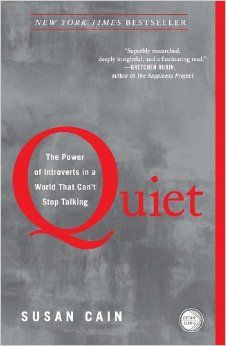
This is the book I read most recently out of this list. I had it for a while but put off reading it because I didn’t like the idea of making myself feel good about being a quiet wallflower. I wanted to be more extrovert and outgoing. When I did get around to reading it, I realised that this bias against introversion we all have is precisely the point of the book.
Quiet is easily one of my favourite books of all time. After reading it, I felt transformed, not into another person but into my true self.
Susan Cain begins the book by saying:
“I have been working on this book officially since 2005, and unofficially for my entire adult life.”
In the book she doesn’t just cite scientific studies. Cain acts as a psychological journalist attending a three-day Tony Robbins event, signing up to social anxiety classes and interviewing students at Harvard Business School, all the while sharing her unique and often funny insights along the way.
She goes back in time to the dawn of self-help and gives us a history lesson on how extroversion became the ideal, showing examples of how advertisements shifted to associate extraversion to their products to increase sales.
Introverts, Cain argues, are biologically more sensitive than extroverts. In the following introversion definition from Quiet, I felt as though I was reading about myself, and so will many HEthens no doubt:
“Introverts tend to be keen observers who look before they leap. They arrange their lives in ways that limit surprises. They’re often sensitive to sights, sounds, smells, pain, coffee. They have difficulty when being observed (at work, say, or performing at a music recital) or judged for general worthiness (dating, job interviews).
Introverts tend to be philosophical or spiritual in their orientation, rather than materialistic or hedonistic. They dislike small talk. They often describe themselves as creative or intuitive. They dream vividly, and can often recall their dreams the next day. They love music, nature, art, physical beauty. They feel exceptionally strong emotions — sometimes acute bouts of joy, but also sorrow, melancholy, and fear.
Introverts also process information about their environments — both physical and emotional — unusually deeply. They tend to notice subtleties that others miss — another person’s shift in mood, say, or a lightbulb burning a touch too brightly.”
If this sounds at all like you I can’t recommend this book enough. You’ll discover more about yourself than if you spent 10 years in a therapist’s chair. You’ll learn about creativity, leadership and learning itself. But most importantly, you’ll learn to love yourself and hopefully help others do the same.
10. Brain Rules – 12 Principles for Surviving and Thriving at Work, Home, and School – John Medina
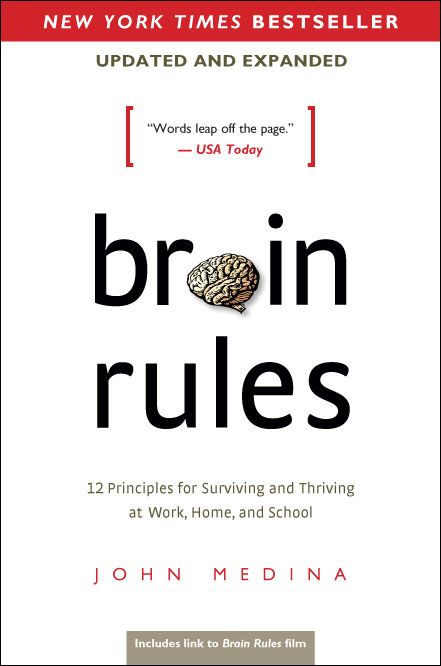
Most of these books teach you how to get the most out of your mind from an emotional standpoint, Brain Rules shows you how to get the most out of your brain in the mechanical sense. In each chapter, developmental molecular biologist, John Medina shows you a different scientific rule to increase productivity and cognitive processing.
He covers everything from sleep to stress, from exercise to memory, and from attention to learning, plus how each one relates to peak performance. If you use your brain in your work (which I’m assuming you do) or rely on other people being at their best, you need to learn these brain rules and start living by them.
All the information is easy to digest and implement. Knowing as much as he does about the brain, Medina has written the book in such a way to optimise your attention and memory. Once finished with this book, you know exactly what your brain is capable of, what rules to implement when and what you should avoid to make it run smoothly.

Jon Brooks
Jon Brooks is a Stoicism teacher and, crucially, practitioner. His Stoic meditations have accumulated thousands of listens, and he has created his own Stoic training program for modern-day Stoics.

